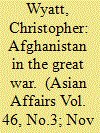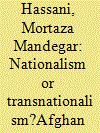|
|
|
Sort Order |
|
|
|
Items / Page
|
|
|
|
|
|
|
| Srl | Item |
| 1 |
ID:
142531


|
|
|
|
|
| Summary/Abstract |
The period of the Great War in Afghanistan was one of the most transformational periods of her entire history. Less than a year after the end of the Great War, both Afghanistan and her relations with the rest of the world had changed forever. The article covers Afghanistan and the outbreak of war, the Niedermayer-Hentig mission from Germany, pressure on the frontier and at court, and the aftermath of the Assassination of Amir Habibullah. At Kabul, the emergence of a ‘War Party’, which favoured the declaration of war on India on the side of the Central Powers, caused difficulties for Habibullah's attempt to remain neutral. Although the War Party was to have some support from the Niedermayer-Hentig Mission to Kabul, it was never strong enough to act until the Great War itself was over. On the other side of the frontier, the tribes were expecting to be called to fight at any moment. Keen to raid into the plains, they initially moved too early and were rebuffed but low-level tribal activity took place all over the frontier, though not at the intensity seen in previous large uprisings. At the same time, the Indian Army was taking out the best troops to send to Europe and other fronts, leaving a comparatively small force to protect the frontier. Large scale response to tribal raiding was not possible but the Indian Army was able to deploy aeroplanes, artillery and machine guns as force multipliers to help make up for the lack of fighting men. The cumulative experience was one of change which needed to be understood and accommodated in short order. Men like Sir Denys Bray of the Foreign Department and Mahmud Tarzi and Abdul Quddus Khan in Kabul were able to do this and, in so doing, facilitated Afghanistan's emergence to independence and nationhood.
|
|
|
|
|
|
|
|
|
|
|
|
|
|
|
|
| 2 |
ID:
180023


|
|
|
|
|
| Summary/Abstract |
Relations between religion and nationalism, as two identity forms, has been debated in Muslim countries, especially where the nationalist trends coincided with the rise of religious reformation and Pan-Islamic movements. This article scrutinizes discourses on linking a transnational ideology of Pan-Islamism with Afghan nationalism in an early twentieth century nationalist newspaper, Seraj-ul Akhbar. The newspaper presents a unique case for this study since it was a platform for dissemination of both ideologies simultaneously. Unlike the later Muslim Brotherhood intellectuals and Muhammad Iqbal, Seraj-ul Akhbar authors did not see a contradiction between Pan-Islamism and territorial nationalism. They formulated a universal Muslim unity going through the national state structure, but not bypassing them. Meanwhile, Seraj-ul Akhbar appropriated the religious language for strengthening national unity. In this way, nationalistic and Pan-Islamic concepts were used to craft a nationally stable identity. It is argued that Pan-Islamism is not a unitary universal transnational ideology, rather it is often embedded in different national, language, and ethnic boundaries.
|
|
|
|
|
|
|
|
|
|
|
|
|
|
|
|
|
|
|
|
|